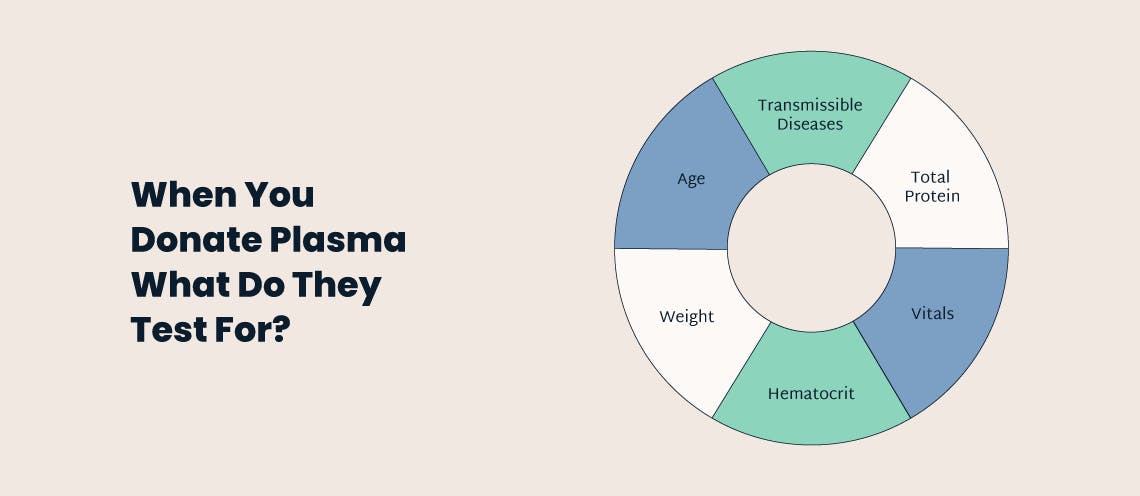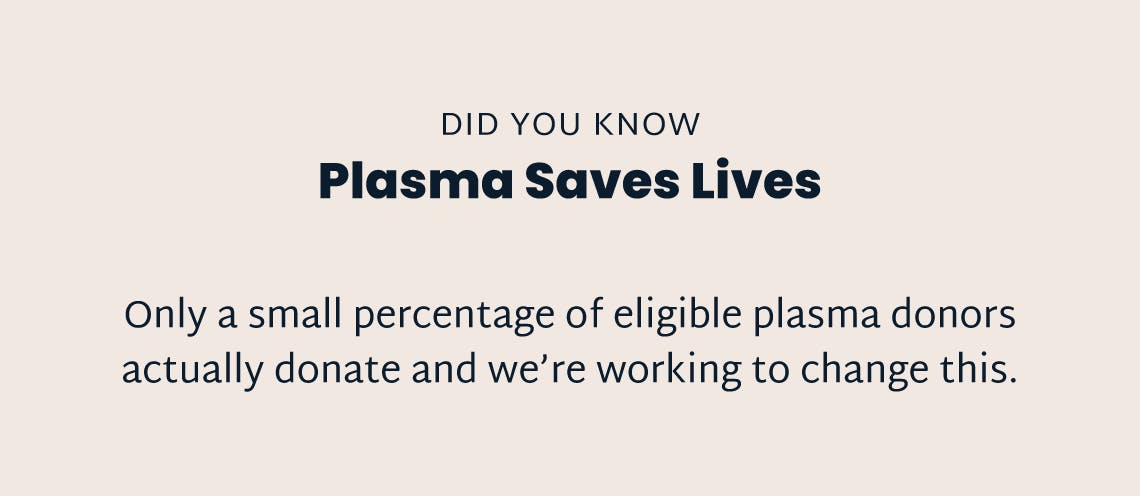
What Can Disqualify You From Donating Plasma?
Interested in donating? Find out if you're eligible and learn more about the donation screening process.
When You Donate Plasma What Do They Test For?
Plasma donation centers use a combination of methods to determine a plasma donor's eligibility. If you've ever donated blood or another blood product at the American Red Cross, a blood drive, blood bank, or another blood center, many of the eligibility requirements will feel familiar.
That's because donating blood has many of the same blood donor eligibility guidelines as donating plasma. These guidelines are determined by the U.S. Food and Drug Administration (FDA) and while there are exceptions, if you're ineligible to donate blood, you are likely ineligible to donate plasma, and vice versa.
Before your first donation, new plasma donors will answer a series of medical history questions and complete a health screening to ensure they're a good candidate.
Here's what to expect from the donation process:
Health Questionnaire
After you check in at your plasma donation center, you'll complete a questionnaire that will ask questions about your medical history, medications you're currently taking, recent surgeries or medical procedures, relevant travel history, recent tattoos and piercings, and assesses your risk for certain transmissible diseases. You'll complete this questionnaire each time you donate.

Age and Weight
After you complete the health questionnaire, a team member will verify your age and weight. To donate at a Parachute center you must be between 18-64 years old and weigh between 110-400 lbs. We'll measure your weight each time you donate to determine exactly how much blood plasma to collect on that day.
Vital Signs
We'll check your vital signs: blood pressure, pulse, and temperature. Your vital signs provide a glimpse into your overall health and help ensure that you're feeling well on donation day. A team member will also perform a quick vein check to make sure your veins are suitable for donation.
Blood Pressure: To donate at Parachute, your blood pressure must be above 90/50 and below 160/100.
Pulse: An acceptable pulse is between 50 and 100 beats per minute when at rest.
Temperature: Your body temperature cannot be above 99.5. If you have a fever or are feeling under the weather please stay home. We'll see you when you're feeling better.
Hematocrit
As part of the plasma donation screening process, you'll receive a quick finger prick to draw a blood sample. Don't worry, we only need a few drops of blood for the sample. The blood test will be used to measure your hematocrit and total proteins.
Your hematocrit is the percentage of red blood cells in your total blood volume. It’s important to measure your hematocrit because the donation process removes red blood cells and iron from your body. We want to make sure you have enough red blood cells to donate safely.
To donate at Parachute, your hematocrit must be within the below ranges:
- Males: 39% - 54%
- Females: 38% - 54%
Total Protein
The total protein test measures the total amount of protein in your blood. It specifically looks at your albumin and globulin levels, which are two key proteins found in your plasma. This test can help detect underlying health conditions that may make it unsafe for you to donate.
At Parachute, your total protein must be between 6 - 9 grams per deciliter (g/dL) in order to be eligible for donation.
Transmissible Diseases
As a safety measure, all donated plasma goes through two tests: a nucleic acid test and a viral marker test. These tests scan for infectious diseases (such as hepatitis B, hepatitis C, HIV) to verify that your plasma is safe to be turned into medicine. Lab techs will also test your donation for syphilis and atypical antibodies.
Test Results
If you were to receive a positive test for a transmissible disease, your donation center is obligated to inform you immediately of your test results. Individuals who test positive for an infectious disease are permanently deferred, which means that they will not be able to donate plasma at any donation center, not just Parachute.
When you are flagged as a permanent deferral, you will be entered into the National Donor Deferral Registry (NDDR). This is an industry-wide database where every donor is checked to ensure they are eligible to donate.
Temporary Deferrals
If you are temporarily deferred, you will be unable to donate for a certain period of time. Common reasons for a temporary deferral are if you have high blood pressure, your hematocrit is out of range, or if you've recently had surgery. You can also be temporarily deferred if you've recently received a blood transfusion or are taking a certain medication. Most temporary deferrals last for a day, but some can last up to 6 months or even indefinitely.
What Can I Do to Prepare For The Plasma Donation Screening?
It's easier said than done, but maintaining a healthy diet is key to having a successful plasma donation and avoiding a deferral. Before every donation, make sure that you're hydrated and are consuming plenty of foods that are high in protein and iron. We also suggest limiting caffeine before your donation, as this can lead to an out-of-range pulse reading. For more tips check out our guide here.
Why Is Plasma Important?
There is a critical need for plasma and plasma donation centers are searching for more donors who are eligible to donate and who want to give back. Plasma is vital to the health of patients across the country and it saves lives.

Doctors will often give plasma transfusions and medicine made from plasma proteins to:
- Trauma victims
- Burn victims
- Shock patients
- Individuals with lung and liver disease
- Patients with primary immunodeficiency disorders (PI)
- Individuals with bleeding disorders
- Children and adults with cancer
- Pregnant women who are Rh-negative
- Those undergoing bone marrow transplants
Plasma is your body's best friend. It does everything from protecting against disease and boosting immunity to maintaining blood pressure and promoting overall cellular health.
Why Should I Donate?
In the wake of the COVID-19 pandemic, more people have become aware of plasma and its life-saving benefits. Besides helping others, donating plasma directly benefits the donor because they receive compensation for taking the time to donate. If you're eligible to donate plasma, we encourage you to give it a try. In as little as one hour, you can help save a life while earning a little extra.
This article is for informational purposes only. It is not, nor is it intended to be, a substitute for professional medical advice, diagnosis, or treatment and should never be relied upon for specific medical advice.
